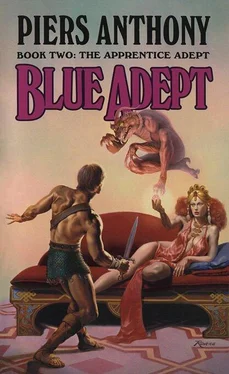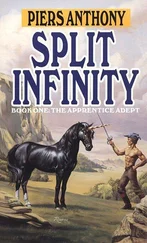Piers Anthony - Blue Adept
Здесь есть возможность читать онлайн «Piers Anthony - Blue Adept» весь текст электронной книги совершенно бесплатно (целиком полную версию без сокращений). В некоторых случаях можно слушать аудио, скачать через торрент в формате fb2 и присутствует краткое содержание. Год выпуска: 1981, ISBN: 1981, Издательство: Del Rey, Жанр: Старинная литература, на английском языке. Описание произведения, (предисловие) а так же отзывы посетителей доступны на портале библиотеки ЛибКат.
- Название:Blue Adept
- Автор:
- Издательство:Del Rey
- Жанр:
- Год:1981
- ISBN:9780808586548
- Рейтинг книги:3 / 5. Голосов: 1
-
Избранное:Добавить в избранное
- Отзывы:
-
Ваша оценка:
- 60
- 1
- 2
- 3
- 4
- 5
Blue Adept: краткое содержание, описание и аннотация
Предлагаем к чтению аннотацию, описание, краткое содержание или предисловие (зависит от того, что написал сам автор книги «Blue Adept»). Если вы не нашли необходимую информацию о книге — напишите в комментариях, мы постараемся отыскать её.
Blue Adept — читать онлайн бесплатно полную книгу (весь текст) целиком
Ниже представлен текст книги, разбитый по страницам. Система сохранения места последней прочитанной страницы, позволяет с удобством читать онлайн бесплатно книгу «Blue Adept», без необходимости каждый раз заново искать на чём Вы остановились. Поставьте закладку, и сможете в любой момент перейти на страницу, на которой закончили чтение.
Интервал:
Закладка:
The ball was on the Black thirty-five-yard line. Time remaining was nine minutes. Those incomplete passes had expended very little time. Still, Stile was getting nervous; he really needed to break loose and score a touchdown. “Number 81—can you receive a lateral?” he asked. “Yuh,” the animal agreed after a brief pause for thought. “Then follow me and be ready.” Stile turned to a line-man. “When the ball is hiked, you turn, pick me up, and heave me over the Black line.” He seemed to remember an ancient penalty for such a trick, but it was not part of the Game rules.
“Duh?” the android asked. The concept was too novel for his intellectual capacity. Stile repeated his instructions, making sure the animal understood what to do, if not why.
When the ball was hiked. Stile tucked it into his elbow and stepped into his lineman’s grasp. The android hurled him up and over. Stile had been given such a lift in the course of gymnastic stunts, and was pretty much at home in the air. He flipped, rolled off a lineman’s back, landed neatly on his feet and charged forward toward the goal line.
This time, however, the Rifleman had a couple of guards in the backfield, and they intercepted Stile before he had gone more than ten yards.
Now Stile lateraled to Number 81, who was right where he was supposed to be. What these creatures did, they did well! The android caught the ball and bulled ahead for eight more yards before being stopped.
They were within kicking range again. Stile decided not to gamble on another running play; he drop-kicked another field goal. The score was now 15-9, with eight minutes remaining. At this rate, he could do it—provided he had no bad breaks. Unfortunately, he was overdue for one of those. He had been playing extremely chancy ball. Should he try another onside kick? No, that would only cost him yardage at this stage. He had to make the Rifle-man travel as far across the field as possible, so that he had the maximum opportunity to make an error. So Stile played it straight.
This time he managed to put the ball all the way into the end zone. The Rifleman put it into play on the twenty-yard line. This time, wary of passing into Stile’s double cover-age, he handed it off to his runner. But the android pr-ceeded without imagination and was downed at the line of scrimmage. Any play left purely to the animals was basically wasted time; the capacities of the androids had evidently been crafted for that. The human players had to make their physical and/or mental skills count. Now Stile was sure the Citizen was beginning to sweat. The Rifleman knew that if he failed to move the ball, he would have to turn it over—and then Stile would find some devious way to score. A touchdown and extra point would put Stile ahead in the closing minutes. But the Citizen was unable to advance the ball. What was he to do? What could he do? He risked another pass to his double-covered android receiver. It was perfectly placed, threading between the defenders to reach its target. How that man could pass! But one defender managed to tip it, and the receiver did not catch it cleanly. The ball squirted out of his grasp, bounced on the ground, and one of Stile’s animals, not realizing the ball was dead, fell on it. It was obviously an incomplete pass. But the referee signaled a fumble. Now it was Stile’s ball on the thirty-two-yard line.
“Now, wait,” Stile protested. “That’s a miscall. The receiver never had control of the ball.”
“Aren’t you aware that these referees are programmed to make at least one major miscall per game?” the Rifleman called to him. “That’s to emulate the original style of play, back on crazy Earth. You happen to be the beneficiary of that error.”
The referees were robots, of course; Stile hadn’t noticed. They could be set at any level of competence. “But that’s luck, not skill!”
“There’s an element of luck in most games. That lends a special fascination. The human species loves to gamble. Play, before you draw another delay-of-game penalty.” The Rifleman did not seem upset, perhaps because this change-of-possession was obviously no fault of his own. Hastily, Stile played. He accepted the hiked ball, faded back for a pass, found his receivers covered, saw three huge animals bearing down on him, dodged them all, circled behind one and safely overthrew his covered receiver. The moment he released the ball, he hunched over as though still carrying it. The turning android saw that and grabbed him, not having seen the ball go. The tackle was bruising despite the armor, but at least the padding protected him from more than superficial abrasion. A flag went down.
Roughing the passer. Fifteen-yard penalty. First down.
Once again Stile was within field goal range.
He drop-kicked again, of course. The audience cheered. The stadium was almost full now; news of this game was evidently spreading. But he had to keep his attention on the field. Now he had twelve points, and six minutes to go. Maybe he could pull it out after all.
But the Rifleman had the ball again, and now he was determined. There were not going to be any more breaks or mistakes.
Stile’s misgivings were well taken. The Rifleman shot his passes too high and fast for Stile to intercept, settling for swift, short gains. When Stile tried too hard he got tagged for interference. Slowly and erratically, but inevitably, the Citizen hammered out the yardage.
On Stile’s thirty-yard line, the Rifleman’s first pass attempt failed. On second down his run got nowhere. On third down Stile gambled on a blitz, sending eight of his animals in to overrun the quarterback before he could pass. It worked; the Rifleman was sacked. Loss of six yards.
Now it was fourth down, and the Rifleman had to kick out. He tried a placekick and field goal, but was too far out; the ball fell short, to Stile’s immense relief. Stile had the ball again, with four minutes remaining.
Time enough—if he could move the ball.
He moved it. He had his animals open a hole in the center, and he slipped through for several yards. He had his passer send a screen pass to him, and he dodged and raced up the sideline for several more yards. He was wise to the ways of the androids, now; he knew their little individual foibles. Some were faster than others; some were less stupid. One android did not have the wit to out-maneuver another, but Stile did. He could get past them—so long as he did it himself, not delegating the job to an animal of his own. So long as he carried the ball himself, he could progress; that was the key. That was why the Rifleman had succeeded so well in moving the ball at the outset, while Stile floundered. The Rifleman had drawn on his own abilities, not limited by those of the androids. Now Stile was doing it too—and had been doing it, every time he kicked. Now, so late in the game, understanding came. It really was a game of two, not of twenty-two. But this was bruising. The constant exertion and battering were taking it out of him, and Stile could not maintain the drive. It stalled out on the Rifleman’s forty-yard line. Too far for another field goal. Stile had to punt, regret-fully.
He went for the coffin comer, angling the ball out of bounds at the four-yard line. That forced the Rifleman to play in his own end zone.
The Citizen was showing overt nervousness now. He did not like being backed up this way. He tried a pass, but it was wobbly and off-target, incomplete.
Now it was time to strike. Stile caught the arm of his center as the lines reformed. “Make a hole to spring me through,” he said, and the creature nodded. The androids were slow thinkers, but they did orient somewhat on the needs of their supervisors. This one now understood what Stile wanted.
When the ball was hiked, the android shouldered into his opposite number, lifting him entirely off the ground. Stile scooted through, so low that his flexing knees hurt, and emerged directly in front of the Rifleman. “Oh, no!” the Citizen exclaimed. Losing his poise, he tried to run from Stile instead of throwing the ball away. It was a mistake; he moved right into a pocket of White linemen and was downed in his own end zone. It was a safety: two points. The score was now 15-14, with two minutes left to play. And Stile’s team would get the ball.
Читать дальшеИнтервал:
Закладка:
Похожие книги на «Blue Adept»
Представляем Вашему вниманию похожие книги на «Blue Adept» списком для выбора. Мы отобрали схожую по названию и смыслу литературу в надежде предоставить читателям больше вариантов отыскать новые, интересные, ещё непрочитанные произведения.
Обсуждение, отзывы о книге «Blue Adept» и просто собственные мнения читателей. Оставьте ваши комментарии, напишите, что Вы думаете о произведении, его смысле или главных героях. Укажите что конкретно понравилось, а что нет, и почему Вы так считаете.











